The CBD Expert Series: Teaching the Truth About Cannabis Through Film
Lindsey Ward is a man with a mission, a vision, and a camera. He travels the world, searching for the truth in a space that’s historically been plagued with misinformation, propaganda, and even danger. Ward is after the truth behind cannabis.
The filmmaker made his first major debut on the cannabis circuit directing Medicinal Cannabis and Its Impact on Human Health, and is now following up with his own docuseries, The Truth About Cannabis. Recently, CBD Oil Review’s Nick Musica sat down with Ward to discuss The Truth About Cannabis, in which Ward interviews doctors, researchers, and other health experts to get the facts about cannabis’ potential to treat a number of diseases and conditions.
Here’s someone who’s fighting fiction with facts to remove the stigma around cannabis.
Note to the reader: The Truth About Cannabis is also referred to as “The Science of Weed”.
Nick Musica (CBD Oil Review): For folks who aren't familiar with your work, can you tell us about The Truth About Cannabis?
Lindsey Ward (The Truth About Cannabis): Yeah, absolutely. This is a film I started five years ago with a small group of like-minded individuals. We ended up raising money, and I traveled with my film crew all over the world interviewing researchers who had discovered a lot of the incredible things that you hear about cannabis, like its anti-tumoral effects and bronchodilator effects, for example.
There's all kinds of phenomenal things we hear about cannabis. Yet, I wanted to see what has been substantiated with scientific evidence. So, I traveled to these places. It took us to Europe, Asia, all over the States, Canada, just trying to try to find these answers. It was a really incredible process. We met a lot of people and learned a lot.
That's what I'm looking at sharing with this film. We also followed patients with a variety of types of ailments, who had all been skeptical or full bore against cannabis, but their illness put them in a place where they had no choice, or they were desperate. And they tried it. Not everybody had the results they were looking for, but so many people had an incredible benefit. It saves lives on a daily basis as you probably already know. This is a five year process of documenting stories like this.
Trailer for The Truth About Cannabis, to be released in full at a later date.
Did you see any themes in the stories you heard or people you talked to?
Yeah, it's interesting. A lot of the best research that's been done was actually by doctors affiliated with major universities with star-studded careers, who were actually trying to prove harm from cannabis use. They get a lot of funding from organizations like the National Institute on Drug Abuse, who really only give funding to researchers who are trying to prove harm.
A lot of those researchers ended up proving benefit, which was not what they were expecting. In this day and age, they're like, “Hey. Well, I want my research to be out there and to be known.” And so these people who are actually on the forefront of the medical marijuana movement, in a strange way, are just wanting their research to be heard and not manipulated.
What sort of cultural changes have you witnessed around cannabis and CBD since you started making these documentaries?
Oh, wow. Well, the first film I published on cannabis was actually in 2011, so The Truth About Cannabis really came about, post-green revolution, post CBD becoming a major household name. In medicine today, everybody knows about CBD, “What's CBD? Oh, yeah. Have you tried it?” It's a big deal now.
I learned about it about a decade ago when I first started doing interviews for my first film, before Sanjay Gupta, before Colorado legalized. It was one of the first films ever done where I really just focused on the medical effects, wasn't interested in pop culture and religious use, and hippies, and whatnot.
I was just genuinely interested in, “What's proven about this plant? What does it actually do?” Research went much further, come 2014 when I started The Truth About Cannabis, and there's a lot more money and a lot more interest. So, I used that to get plane tickets and a crew to travel around the world and actually go to those researchers.
How have your own personal experience with cannabis been affected by your experience as a filmmaker?
To answer your question, when I first got involved in this, I had used cannabis recreationally as a teenager, and it was quite a destructive force in my life at the time. I wasn't really mature. At a time when I needed guidance and direction, it did not serve me in that way. And so my experience with it as a teenager was something that kind of messed me up.
Now, fast forward to when I was doing my first film in 2009, I was sitting down with Donald Tashkin at UCLA and he's done the most comprehensive research on the effects of smoking cannabis on lungs and lung function. He figured that it would cause lung cancer. He also hypothesized that it would contribute to emphysema. He's done this research, at this point, for about 40 years now, so he has a ton of data spanning four decades.
I was just sitting in a chair, interviewing him, and then he told us, “Well, I followed people around who were smoking cannabis every day, at least three joints a day on average, for 15 years straight. So, these are heavy, heavy cannabis smokers, that I found, from measuring their lung function, that they had no increased risk of getting emphysema. They also had a reduced risk of getting lung cancer.”
Dr. Donald Tashkin of UCLA speaking on his early experience researching cannabis and THC for The Truth About Cannabis.
Most people would think if you smoke weed, you get lung cancer. Donald Tashkin proved the opposite, that not only do you not get lung cancer, but that you actually have less chance of getting lung cancer. And this was a very well-designed study. They also followed people who didn't smoke, drink, or do any drugs at all. They followed people who smoked cigarettes and it was just insane, the increased likelihood of getting emphysema and lung cancer. They also studied people who smoked cannabis and cigarettes, and found that there was no potentiation there, that smoking cannabis alongside it didn't increase the likelihood of getting cancer beyond what they were already risking by smoking cigarettes. It was a very elegant, well-designed study that's kind of the “end all” on that subject.
It sounds like that interview was a major turning point for you.
I literally almost fell out of the chair. I was so shocked. I was like, “Well, how is that so?” And he said, “Well, a lot of studies have shown that THC actually has an antitumoral effect, that if you inject THC into a tumor, like a glioma, which is brain cancer, the tumor shrinks.” It also stopped metastatic spread, which is usually what kills most people. Cancer spreads all around the body. At the time, not a lot of people knew about this.
I was just completely shocked. Like, really? Why aren't we studying this as a potential cure for cancer? That's really what opened up this whole world to me. Cannabis could be the cure that the world has been waiting for, yet our government's not letting us study it because the powers that be that would rather have cannabis illegal.
In the past 6 to 12 months, we’ve seen a lot of policy changes around cannabis: Canada legalized it, the 2018 Farm Bill passed, and states have been legalizing its medicinal and recreational use.
What are some of the biggest political or social changes you’ve noticed during your time making this documentary?
Oh, a lot. The ones that you just mentioned are all big. Another one I'd throw in the pot, that is a big deal for me especially, is now we have FDA-approved cannabinoid therapies that aren't just synthesize molecules. We actually have plant medicine in a tincture, and it had been removed from the US Pharmacopeia back in the 1940s. Still to this day, cannabis is still considered by our federal government to be an illicit substance. I was just completely shocked. Like, really? Why aren't we studying this as a potential cure for cancer?
But GW Pharmaceuticals got Epidiolex approved by the FDA. That is a tincture of cannabis that people can now get a prescription for. That's incredible change. When I first started doing this 10 years ago, it would be hard to imagine that. Yet, nowadays, with all the momentum and everybody finding out about it, and all the stories of healing that have been spreading around, anecdotally at least, there's just so much momentum. You can't keep the truth down when there's so many people who need it. It's just spreading like wildfire and it's really exciting to see.
Where would you say we're going to be in 12 to 24 months with cannabis, specifically in the States?
Well, of course, we're going to continue to see more states legalize both medical and recreational. But I think in the next few years, we might be nationally legalized because we passed the tipping point a while ago where over half the population in the United States was in favor of medical. But even at this point, more than half the population is in favor of recreational. It's just a matter of time before legislation catches up with that.
Unfortunately, we have lawmakers who are still kind of stuck in the old mentality of propaganda and “good old boy” logic. But those people are getting older and they're leaving this plane of existence. I think that's a benefit for the cannabis movement. I think we're going to see major changes in the next two to three years.
Do you think we're going to need to keep on going state-by-state, or do you think there's going to be a federal change?
State-by-state until there is a federal change.
I think in the next few years we're going to see a federal change. But over the next one to two years, it's going to continue. We're seeing how much revenue all these other states are generating and that's a great a incentivizer, money.
States with legal medical marijuana are also seeing a decline in accidental deaths from opioid overdoses. Also, recreational have seen sharp declines in that, around 20%, just by having cannabis accessible to the masses. When people see data, it's quite convincing.
Cool. Thanks, Lindsey. Where can folks find The Truth About Cannabis?
Right now, the only piece we have out is on Rolling Stone. If you go on Rolling Stone and look up Truth About Cannabis, a few videos will pop up and some articles and information. But it's not going to be for a few months that we're going to start releasing more pieces. Just stay tuned. I'll let you know.
Are there any cannabis documentaries you’d recommend?
Grass is Greener was fabulous. Highly recommend it. It's streaming on Netflix, very well done.
I also interviewed Ricky Lake and her partner. I'm trying to remember her name, Abby Epstein. They did a film called Weed the People.
Trailer for Weed the People, a film documenting families’ experiences using cannabis to combat childhood cancer.
How did that go?
The interview was great. We got to hang out and talk. Just hearing some of their stories was a lot of fun. I think it's great that a celebrity talk show host comes out and supports and finances this movement. I think that's really great when mainstream Hollywood gets involved.
I think that the stigma of prohibition is still present, and a lot of the professional world uses cannabis on a daily basis, but we just don't know about it. I just really appreciate those brave souls out there who come out and say, “Hey you know what? I'm a classy professional. Everyone knows me, and everyone knows I do great work. And quite frankly, I've used this for my own benefit for quite some time.” I really appreciate that.
Because that's what it takes to open minds. Some people, they're afraid of being looked at a certain way. They're afraid of the stigma. They're afraid of being classified as a stoner and all the other nonsense that actually prevents people from a lot of good things in life. Even if you don't have an ailment, I think it's oftentimes a safe alternative to a lot of other substances out there that are commonly utilized.
You were recently in Vegas, getting an award. Can you tell us about that?
Sure. I received an Impact Award from the Action on Film Festival, which is a huge honor. I was the table next to some of the Baldwins and a bunch of other industry heavyweights, so I was very humbled to share the stage with some of them. I received an award for a film I did called the Sacrament, which I filmed on the spiritual use of cannabis. I think that's something that's been kept from the public as well. It's an ancient plan. It was used around the world for thousands of years. As you can imagine, some people used it ceremonially. The reverence and the respect that type of mentality and approach showed me I think is really valuable in this day and age when there are “stoners” out there and a lot of people who just use it recreationally.
I don't necessarily think there's anything wrong with that. I just don't think that that approach is for everyone, especially in this a medical conversation. So, to see folks who have used it for many generations with reverence and respect, I look to them to show people today, “What are the best practices? What are the things that we should consider when using it? Give us another perspective.” I think that spiritual use perspective is really valuable today.
This is reminding me of my chat with Wendy Turner, whose son Colton uses cannabis for his Crohn's. Wendy’s mom suggested “You get back to the earth,” which sounds like we're talking about the same thing here.
Some people, they're afraid of being looked at a certain way. They're afraid of the stigma. They're afraid of being classified as a stoner and all the other nonsense that actually prevents people from a lot of good things in life.
Yeah. Again, sometimes, that even has a negative stigma.
It's like, “Oh, you sound like a hippie or something like that.” But really, we are of the earth. We're flesh and bone. We are earth beings. So, I think it's important for us to go back to those natural things that our bodies can actually process and metabolize.
When we have these really powerful, single, isolated-molecule pharmaceutical drugs, our bodies oftentimes don't know how to process it. That's why we experience so many side effects. So many other systems in our body are affected by this one molecule, when maybe you're just targeting one effect.
But then you have several unwanted side effects that can be deadly. We see that with opioid epidemic today. There's so many people dying who just want pain relief. That's what I imagine most of them are after.
These unwanted side effects aren't really the case with cannabis. You're not going to die no matter how much you take. In most cases, you get pain relief that you couldn't otherwise get from opiates. When we have these really powerful, single, isolated-molecule pharmaceutical drugs, our bodies oftentimes don't know how to process it. That's why we experience so many side effects.
Can you tell us more about what you’ve learned about Eastern versus Western medicine, older versus new philosophies, plant-based versus pharmaceutical?
Just mentioning those other medical systems from the East, for instance, I was shooting in India with some Ayurvedic medical doctors, which is one of the oldest medical systems in the world. They've characterized thousands of medicinal plants, just an unbelievable amount of plant-based knowledge that they use with great skill, as do traditional Chinese medicine doctors.
In both of those systems, Ayurvedic medicine and traditional Chinese medicine, use cannabis for all different types of ailments and therapies.

Ayurvedic medicine, or Ayurveda, is one of the oldest medical systems in the world. Healthy lifestyle choices and plant-based medicines are used to maintain balance in the body, mind, and spirit.
And a lot of our present day medicine comes from plants, historically. I think Aspirin comes from willow bark.
Yes. Still to this day, when you look at pharmaceuticals, 80% of them were just synthesized from plants.
Even our Western medicine today is mostly based on plant medicine. Just the thought that we can't use plants or plants aren't as good is really ridiculous.
But I feel the pendulum kind of swung towards the western system for a while. And now, with people getting hip to the side effects and the dangers of Western medicine and addiction, and constant misdiagnosis, I think the pendulum's swinging the other way.
With Western medicine today, we have transplant surgeries. Look, if I get in some crazy car wreck, I don't want to go to an acupuncturist. I need to go to the emergency room where they can put me back together. Right?
That's the kind of thing that I think we need to recognize—what each system is best for, and then have a more integrative approach. That's where I think medicine's heading and that's where I think the future of medicine is definitely going.
More Expert Series Interviews
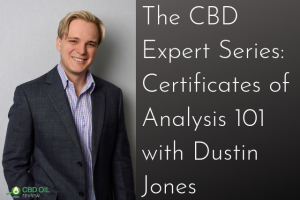
The CBD Expert Series: Jackie Bowen on Mislabeled & Misleading CBD Oil
Read More
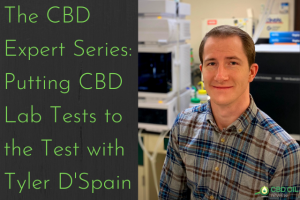
The CBD Expert Series: Putting CBD Lab Tests to the Test with Tyler D'Spain
Read More
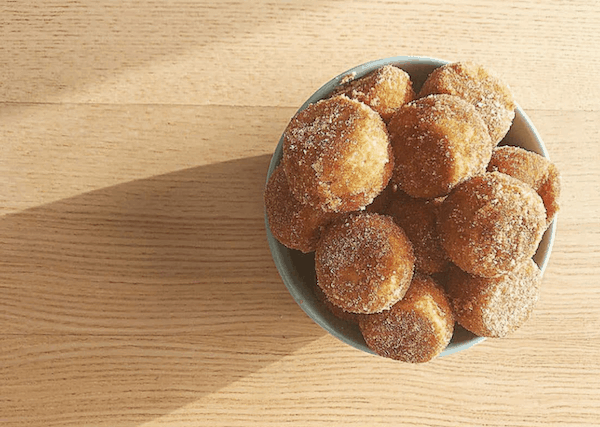
MasterChef Nick Nappi's CBD Apple Cider Donut Hole Recipe
Read More
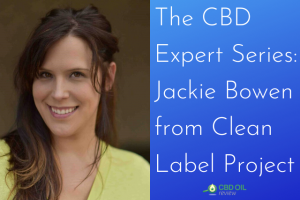
The CBD Expert Series: Jackie Bowen from Clean Label Project
Read More

The CBD Expert Series: Certificates of Analysis 101 with Dustin Jones
Read More
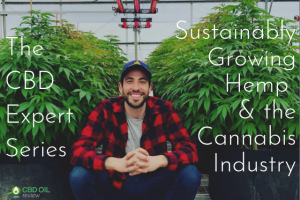
The CBD Expert Series: Sustainably Growing Hemp & the Cannabis Industry
Read More
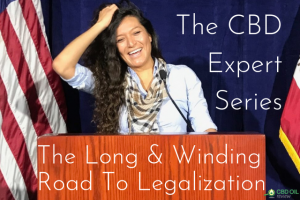
The CBD Expert Series: The Long & Winding Road To Legalization
Read More
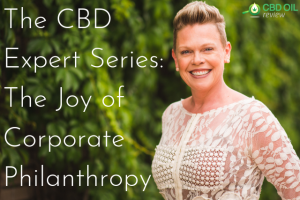
The CBD Expert Series: The Joy of Corporate Philanthropy
Read More
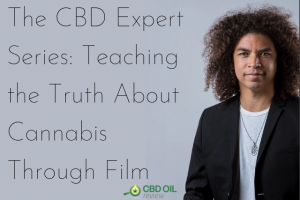
The CBD Expert Series: Teaching the Truth About Cannabis Through Film
Read More
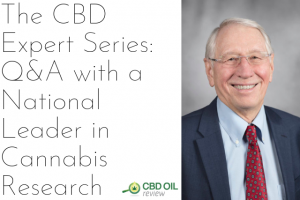
The CBD Expert Series: Q&A with a National Leader in Cannabis Research
Read More
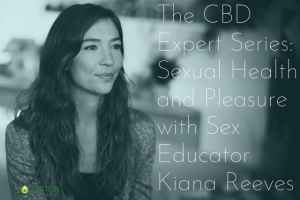
The CBD Expert Series: Sexual Health and Pleasure with Sex Educator Kiana Reeves
Read More
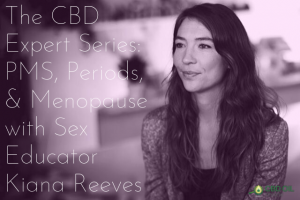
The CBD Expert Series: PMS, Periods, & Menopause with Sex Educator Kiana Reeves
Read More
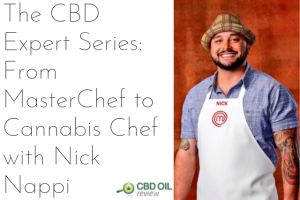
The CBD Expert Series: From Masterchef to Cannabis Chef with Nick Nappi
Read More
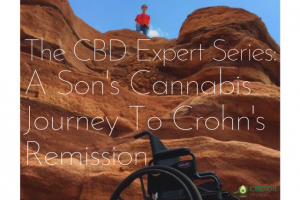
The CBD Expert Series: A Son's Cannabis Journey To Crohn's Remission
Read More
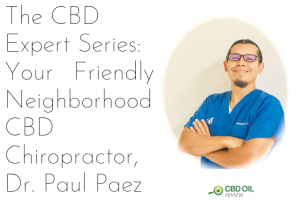
The CBD Expert Series: Your Friendly Neighborhood CBD Chiropractor, Dr. Paul Paez
Read More
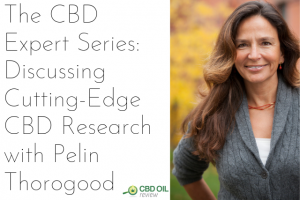
The CBD Expert Series: Discussing Cutting-Edge CBD Research with Pelin Thorogood
Read More
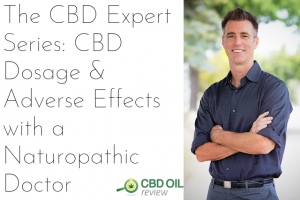
The CBD Expert Series: CBD Dosage & Adverse Effects with a Naturopathic Doctor
Read More

The CBD Expert Series: Talking Drug Tests with a Lab Tech
Read More
Opinions expressed in this article are those of our guest (the interviewee) and not necessarily of CBD Oil Review.
6 Smart Questions to Ask BEFORE You Buy CBD
Get the Ultimate CBD Buyer’s Guide and you won’t look at CBD the same way again!



 search
search